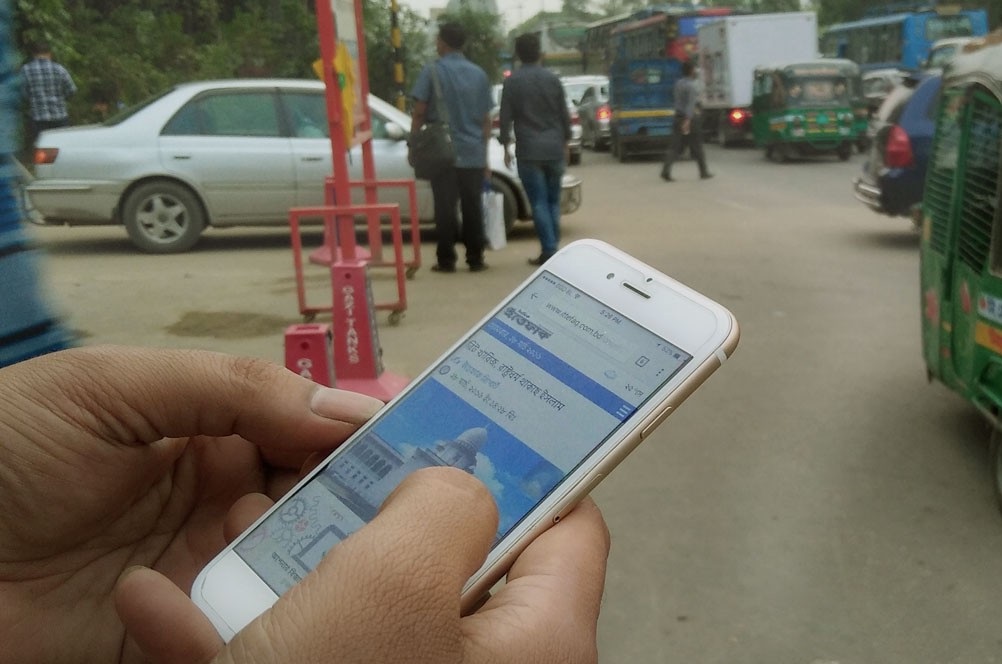
This past Eid holiday, I came to correct my previously held misconception about internet penetration in the rural areas in Bangladesh. Here is the truth, people in the rural parts of Bangladesh spend a humongous amount of time on the internet, particularly women and young people.
The problem, however, is that many of these people are not aware of the fact that they are using the internet because they are on the Facebook. In their understanding, there is no internet but Facebook, thanks to Free Basics program, domesticated version of the internet from Facebook.
A significant number of these people are extremely active on Facebook, have their community, communicate with each other and in fact, buy things through Facebook except that they rarely take advantage of other benefits that the internet brings. And they live in the bubble that Facebook helps create for them.
Bangladeshis spend a staggering amount of time on Facebook. The Q2 report of 2017 of Global Digital Statshot has ranked Dhaka second in the world in terms of having the most active Facebook users. According to the report, Dhaka has 22 million active internet users, which is 1.1 percent of the total monthly active users of the social networking site across the globe.
This is not a new phenomenon and neither unique to Bangladesh. This anomaly first came to light when an Indonesian researcher, Helani Galpaya, discovered it in 2015 while surveying internet users in Indonesia, a substantial percentage of whom reported that they use Facebook but not the internet. The same phenomenon was also found in Africa from a research conducted by Research ICT Africa where they found that the number of people who responded they used Facebook was much higher than the people who said they used the Internet. The unique challenge to Bangladesh, however, is that we are don’t have a research to prove the phenomenon yet.
Free Basics and Facebook’s ambition
Free Basics, now controversial free connectivity program from Facebook, now offers free but limited Internet surfing in 63 countries around the world through partnerships with local telecoms communities. In Bangladesh, it started with Robi Axiata Limited and now has partnerships with almost all the telecom operators. Looks altruistic from outside, Free Basics is part of Facebook’s overall ambition of connecting the world to the internet which it has been pursuing since 2013. To some extent, it has succeeded but the new wave of internet users is not necessarily internet users, some of them are only Facebook users.
The problem with Free Basics is that it is hard to call it the internet. In essence, it is a set of Facebook-curated websites — including news, health, and employment sites — can be available for mobile users to access without data charges.
Although the stated objective of the program is to bring the internet to developing countries, the reality is much different.
From a recent Niemanlab report:
“a close review of six countries where Free Basics operates by Global Voices researchers reveals significant hiccups in Facebook’s stated goal of bringing Internet access to developing regions of the world. Technologists and activists with the citizen media and research group conducted research in Colombia, Ghana, Kenya, Mexico, Pakistan, and the Philippines this past spring and found that not only did the app offer a very limited window of local news content and local languages, the “data and content limitations built into Free Basics are largely artificial and primarily aimed at collecting profitable data from users.”
The Disconnect
It is not that Facebook is all bad. In fact, it is the opposite. In Bangladesh Facebook enables a host of things starting from communication to commerce to public opinion. There is an entire group of businesses dubbed f-commerce built on the Facebook.
The problem is not Facebook rather it is over dominance and filtered nature of ecosystem. On Facebook, you are constantly feed things that you agree with and like. The algorithm is designed in such a way that you seldom come across opinion that are diverse or not in accordance with your own opinion.
Then there are other issues as well. When a single platform becomes extraordinarily powerful, the chance for other smaller platforms to grow big shrinks. In Bangladesh, eCommerce companies are already feeling the heat of building an independent platform.
This has far-reaching repercussion, more damaging than the mere small business and communication gains.
“This is more than a matter of semantics. The expectations and behaviors of the next billion people to come online will have profound effects on how the internet evolves. If the majority of the world’s online population spends time on Facebook, then policymakers, businesses, startups, developers, nonprofits, publishers, and anyone else interested in communicating with them will also, if they are to be effective, go to Facebook. That means they, too, must then play by the rules of one company. And that has implications for us all.”
